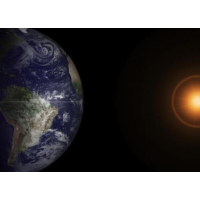90% of Americans Value Scientific Research, but Only 74% Know that the Earth Revolves Around the Sun
 (AP graphic)
(AP graphic)
Science represents an important and worthwhile part of U.S. society, according to the vast majority of Americans polled in a new survey.
But some of the respondents could use a refresher course on important scientific facts.
The survey, involving 2,200 people and conducted by the National Science Foundation (NSF) found more than 90% think scientists are “helping to solve challenging problems” and are “dedicated people who work for the good of humanity.”
A third of those surveyed would like to see science and technology research get additional funding. Ninety percent said they believed the benefits of such research outweigh any potential dangers.
The NSF also asked Americans nine questions to test their knowledge about the physical and biological sciences.
The average score was only 6.5 correct answers.
Just over 25% of respondents didn’t know the Earth revolved around the sun.
More than half (52%) didn’t know human beings evolved from earlier species of animals.
-Noel Brinkerhoff
To Learn More:
Survey: Americans Struggle with Science; Respect Scientists (Michigan State University)
America — But Not Americans — Leads World in Science (Slashdot)
U.S. Elementary Students Trail in Math and Science on World Academic Stage (by Noel Brinkerhoff, AllGov)
- Top Stories
- Unusual News
- Where is the Money Going?
- Controversies
- U.S. and the World
- Appointments and Resignations
- Latest News
- Trump Orders ICE and Border Patrol to Kill More Protestors
- Trump Renames National Football League National Trump League
- Trump to Stop Deportations If…
- Trump Denounces World Series
- What If China Invaded the United States?






Comments